Peter MALONE
Saturday, 18 September 2021 19:52
In the Winter Dark
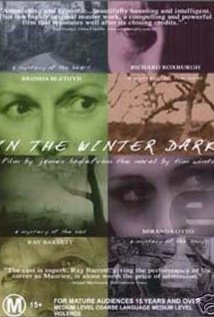
IN THE WINTER DARK
Australia, 1998, 92 minutes, Colour.
Brenda Blethyn, Ray Barrett, Richard Roxburgh, Miranda Otto, Steve Le Marquand, Les Dayman.
Directed by James Bogle.
Tim Winton wrote the Novella.
The film is as dark as it sounds, story of memories and dreams, of mysteries, where the unconscious might be acting out destructively in the real world, or the story might be an examination of conscience.
Ray Barrett Brenda Blethyn (Secrets and Lies) play an elderly couple who lived in the Megalong Valley in the Blue Mountains outside Sydney. They are forced to come to terms with the meaning of their lives. A mysterious creature is prowling and destroying the local cattle.
Miranda Otto and Richard Roxburgh play to younger people who are the catalysts of change.
The photography of the remote valley, the score and the atmosphere of dreams means that this is very much mood piece.
1. The novels of Tim Winton? Film versions? Winton’s perceptions of human nature, grim perspectives, symbols?
2. The colour photography, the Megalong Valley, the mystery of the Blue Mountains? Sequences during the day, sequences of the darkness of the night? The musical score? Jacob and his listening to the blues music?
3. The basic narrative of the plot, the menacing animal, the destruction of the cattle, the response of the local people, of Nick, the Minister? The effect on Maurice and Ida? The effect on Ronnie? Jacob? The film being much more than the basic narrative line?
4. The title, ominous, the emphasis of darkness, the season of winter?
5. The symbol of the creature killing the cattle? In reality? As the destructive symbol in the psyche of each of the characters?
6. The unconscious? Surfacing in memories, fears? The examination of the past, conscience?
7. Maurice, his age, his narrative, his interpretation of what was happening? His relationship with Ida? The long marriage? Each taking the other for granted? Sitting and having cups of tea? The response to the creature, fear, memories of the child and cot death? Recriminations? Ida, her response, the friendship with Ronnie, the scene with them drinking? The touch of lightness and humour?
8. Ronnie, a place in the valley, pregnant, abandoned by her boyfriend, the atmosphere of the creature, its effect on her, with Jacob, with Maurice, the
drinking sequence? The importance of being pregnant – and the couple’s memory of their child?
9. Jacob, age, lonely, tense, listening to the music, interactions with the other characters, creature, precipitation of the crisis?
10. An intense drama, interactions, though with a measured pace? Mood piece?
Published in Movie Reviews
Published in
Movie Reviews
Tagged under
Saturday, 18 September 2021 19:52
Out of Sight
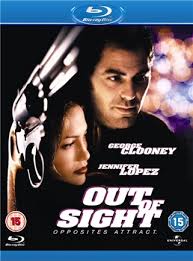
OUT OF SIGHT
US, 1998, 123 minutes, Colour.
George Clooney, Jennifer Lopez, Ving Rhames, Don Cheadle, Catherine Keener, Dennis Farina, Steve Zahn, Albert Brooks, Luis Guzman, Isaiah Washington, Viola Davis, Nancy Allen, Michael Keaton, Samuel L Jackson.
Directed by Steven Soderberg.
Elmore Leonard writes crisp, pacy, crime actioners. “hard-boiled” is often used about his characters and plots.
Out of Sight fulfils these descriptions.
George Clooney is a recalcitrant bank robber who relies on charm rather than physical violence. He is shrewd but definitely not infallible. He gets caught up in jail escape, a plan to rob a Wall Street type, and an attraction towards a US Marshall, Jennifer Lopez, who continually tracks him down.
Director Steven Soderberg is best-known for dramas and he brings this skill to enhance the thriller. Dialogue is often witty. The range of criminals is from forgivable to repellent and the plot has some good twists.
Clooney is well suited to this role. Supporting cast is very good with appearances by Michael Keaton and Samuel L.Jackson. An entertaining Elmore Leonard story.
1. The title? An Elmore Leonard story? Set in his favourit, Florida and Detroit?
2. The career of Steven Soderberg, his many collaborations with George Clooney?
3. Characters, serious and comic, criminals and their crime, robberies and white collar, the law, prison?
4. The title, its overtones?
5. Jack Foley and his story, George Clooney, the style of the 1990s? First impression of Jack, his anger and frustration, going into the bank, the suave conversation with the bank teller, the setup with the official at the table, going to steal the car, it’s not starting, the police waiting, in prison, his past life and prison connections?
6. Chino and his associates, their place in the prison, the tunnel, Jack having information, talking to the guard, to meet in the chapel? His phone calls to Adele? The lights, the guns? The guards, the lights of the shootouts? And Karen’s witnessing it all? Buddy, his background, Jack’s buddy, arriving with the car, helping, the escape?
7. Glenn, dumb, with the car, running out of petrol, the reaction to Jack, talking with him, Buddy’s reasons for having him along, going to the car, Karen persuading him to drive off?
8. The visit to Adele, her life, circus and explanations? With Jack? Karen’s visit? Glenn and his fascination about the circus?
9. Jack and, the guns, in that trunk together, close, their talk and repartee, the gun, the surrender, and Karen smart in going with Glenn?
10. Karen, father, the gift of the gun for her birthday, the boyfriend and his role in the FBI, the father and his pride in his daughter?
11. Jack and Buddy, waiting in the hotel lobby, waiting to carry? Cameron wanting to be involved in the search, yet they are they going upstairs to the empty room? The plan, the robbery, Ripley, the contacts in prison, Maurice, his role? Glenn and his involvement? Going to Detroit?
12. , His role, at home, his sister and her strong stance?
13. Ripley, white-collar, in prison, Maurice and the attack, the stabbing? Getting out? Everybody going to Detroit? Everybody going to the house, Midge and her relationship with Ripley, Lies? Her giving the code?
14. John and Buddy finding Ripley hiding, discussion, the fish tank and the diamonds? The fiasco with the shootings, the fat man and eating and shooting? The confrontation with Maurice? His death? Karen coming into the house, watching, shooting and saving Jack?
15. Jack and his arrest, travel in the van with Samuel L Jackson, the uncertainty of the ending – with Karen keeping an eye on Jack?
Published in Movie Reviews
Published in
Movie Reviews
Tagged under
Saturday, 18 September 2021 19:52
Flash of Genius
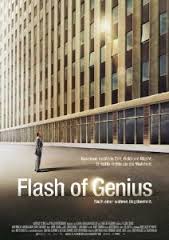
FLASH OF GENIUS
US, 2008, 119 minutes, Colour.
Greg Kinnear, Lauren Graham, Dermot Mulroney, Alan Alda, Daniel Roebuck, Mitch Pileggi Jake Abel, Bill Smitrovich.
Directed by Marc Abraham.
The term 'flash of genius' comes from United States Patent Law. The US requires that an inventor be able to show authorities not just that they have created something new and want to protect it but that they can demonstrate what was the moment of the flash of genius when they thought of their invention and followed through.
The particular flash for this film is that for developing intermittent windscreen wipers that kept the windscreen clear even in the worst of rain. Like many inventions we take for granted, someone had to realise the need and develop the technology to achieve it. (My nominee for a Nobel Prize for science or for engineering would be for the inventors of wheels on suitcases.) The man concerned was Robert Kearns, an engineer and lecturer in Detroit who wanted to make his mark with something creative and who (on his way home from Mass where he was an usher and a collection bearer) experienced beating rain in the car with his wife and six children and thought that there could be better windscreen wiper protection.
Some audiences may not feel that they want to spend a lot of time watching experiments to perfect the rate of intermittent wiping. Some may also feel that they are not up to the technical language in the invention and testing phase as well as in the courtroom sequences. However, the screenplay aims at being lay-friendly.
Kearns, who could be rather prickly in his interactions with people, even though he is played by one of the most genial American actors, Greg Kinnear, closely guarded his research and his early attempts to perfect the wipers and their timing. Persuaded by his friend and partner, spare parts entrepreneur, Gil Privick (Dermot Mulroney), he goes into discussions with Ford. All seems to be going well. His wife is supportive. His older sons help with the testing. He is given the green light to produce his invention. Then suddenly Ford opts out.
The film actually opens with Kearns in a state of mental collapse, and the first half of the film shows the invention and Ford years leading to the collapse. The second half of the film is about Kearns and his many years' obsession against the Ford company, not so much interested in money but in getting the acknowledgement for his intellectual property. And obsessive he becomes. The tension with his wife (Lauren Graham) becomes palpable. His oldest son loathes him. He exasperates Privick and his wife, his lawyers (a cameo by Alan Alda) and everyone around him. Rather than settle outside court, he spends years preparing to take Ford to legal justice and conducts his own defence, with the assistance of his now sympathetic children.
The climax, as in so many American films (one might call them Capraesque after those films of Frank Capra which finished with some assertion of the human spirit but which, nevertheless, acknowledged much sadness and bitterness), is in court hearings and important speeches. It is also, to use the cliché, David versus Goliath.
There must be many American inventors who appreciate the fight Kearns conducted against Ford allowing them to rightly claim what they created. However, the film leaves the question as to the enormous emotional cost, loss of family and submerging oneself in an uncertain legal world for so many years. This film is an interesting tribute and a celebration of a blessing, but a mixed blessing.
1. A true story? Invention, protest, campaign, the law and justice? A David and Goliath story?
2. A Detroit story, the city, cars, companies, the motor industry tradition, the place of Ford?
3. The city, the streets, homes, church, offices, warehouses, courts? The musical score?
4. The title, the explanation, patents?
5. Inventions, windscreen wipers and their pace, the car windscreen in the rain, the focus on the eye, on blinking? Robert Kearns and his story about his wedding night, the champagne cork, into his eyes, the loss of sight in his eye, legally blind in that eye? And the insight about blinking and the rate for the wipers?
6. Greg Kinnear as Robert Kearns, the opening, the bus, the kite, his bewilderment, the police, going to the institution?
7. Going back to the original story? Detroit, the 1960s and 1970s? Robert Kearns in himself, a qualified engineer, lecturing at the University, his personality, a touch prickly? His love for Phyllis, the children? At church, devout, his friends, the money collection? Phyllis wanting another child? The breakfast sequence of life in the family?
8. Privick, his partnership, help, the company, the invention, the tests, initially going to Ford, discussions but not allowing the officials near the car? The demonstration? Later, the promise of help with the production, the warehouse, preparing it, Privick and his telling him about what Ford had done? Kearns and
his being upset? The tension between the wives?
9. Kearns, his integrity, inventing, teaching, the patents issue, Privick helping him with the sale of patents and his ownership?
10. The decision about the case, the effect on his family, his obsession? The initial support Phyllis? Weariness over the years, with drawing?
11. Ford, the official coming with the payment, trying to persuade Kearns, Kearns’resistance?
12. The effect, his breakdown, going to the institution, coming home and reaction of the family, some embarrassment?
13. Finding documents, getting research assistants? Getting the specifications?
14. Going to Gregory Lawson and his associates? The enthusiasm, issues of justice? The long investigations, the meal, the champagne, the large payout, Kearns and his refusing, Wilson and his upset?
15. Talking with his son, the son and his refusal, embarrassment? The later discussions as the years passed on his daughter helping, the son changing heart?
16. The decision to defend himself, studies in the library?
17. At the court, the approach of the judge, hearing the experts? Ford and saying that Kearns didn’t invent anything that was not previously invented? His use of Dickens and A Tale of Two Cities and the arrangement of words for something creative?
18. His‘s having to interview himself, the awkwardness of this?
19. Bringing up his mental breakdown, the fact that he could not remember things accurately, especially saying that he was invited to the White House by the Vice President? Kearns and his talk about imagination?
20. The two with their appeals speeches? The decision, the effect?
21. Kearns and his family, Phyllis and her alienation, the justice victory, and using the law? Comparatively small case but with large implications?
Published in Movie Reviews
Published in
Movie Reviews
Tagged under
Saturday, 18 September 2021 19:52
Peacock
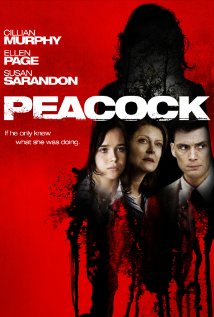
PEACOCK
US, 2010, 90 minutes, Colour.
Cillian Murphy, Ellen Page, Susan Sarandon, Josh Lucas, Bill Pullman, Graham Beckel, Keith Carradine.
Directed by Michael Lander.
Peacock is a somewhat misleading name for the film. It is the name of a town in Nebraska where the action takes place in the 1950s. It is our portrait of a small American town, the people who work at the bank, people who work at the diner, the local senator and his wife, the campaign efforts, the local policeman and his concern.
However, the main focus is on the character played by Cillian Murphy who had played a cross dresser in Neil Jordan’s Breakfast on Pluto. We first see him as Emma, putting out the washing, preparing breakfast, the train passing by the backyard of their house. Then we see him as John, getting ready for work, eating the breakfast, riding his bike to work, getting a workload from his boss (Bill Pullman) and diligently working.
He might have been able to live this double life but a train is derailed and crashes into the backyard of his house while Emma is working with the washing. A photo is taken of her rescuing a child and she become something of a celebrity. This means that John has to work harder to separate the identities of his two personalities, especially when Emma is in favour of using the train as a venue for a political rally while John is not and pays for the removal of the train.
Also complicating matters is Maggie (Ellen Page) a young unmarried mother who comes to John for financial support to leave the town. Emma, on the other hand, wants Maggie to go to the local refuge run by the Senator’s wife (Susan Sarandon).
Audiences may be reminded of Psycho, but this is a more gentle treatment of this kind are subject, even though a death and false identity are key to the plot.
1. The title? The name of the town? Nebraska in the 1950s? The focus on the town, homes, the bank, the diner, trailer way of life, the passing train? The musical score?
2. Atmosphere, costumes and decor? The period?
3. The political background, the Senate campaign, people at the rallies, the preparation for the rally at the derailed train?
4. The introduction to Emma, the washing on the line, the train passing, preparing the breakfast? The introduction to John, waking, dressing, the breakfast, riding his bike, his job at the bank, the discussions with his boss, the workload? His bosses later complaints?
5. At which point in the film did the audience realise that John and Emma were the same person? The opening credits with the background of the mother’s voice, the picture of John, her criticising him, saying she did not love him any more? His mother and her death? The arrival of Emma? Different from John’s mother? (Audiences and their thinking of echoes of Hitchcock’s Psycho?)
6. The train passing, the crash, the effect? Emma and her presence? Saving the child? The picture in the papers? The press? The Senator and his wife, her visits, the plan for the rally? The local police officer and his visits, trying to meet John but meeting Emma? Trying to help?
7. Emma in favour of the rally? John against it? The clashes? The effect on John, at home, going out, covering and making excuses for Emma? His going to the man to pay for the removal of the train, and the man coming, demanding the money from Emma?
8. Maggie, relationship with John, her child, asking for money? Wanting to leave the town? Her working at the diner, the violent treatment from the owner? Going to the house of refuge at Emma’s insistence? The shelter, her resistance, being persuaded? Maggie being confused because of the two?
9. Fanny, the Senator’s wife, political intentions, her care, interest in women, the refuge? Visiting Emma? Emma and hesitant driving the car? The shelter, the visits? The difficulties in dealing with Emma, the reaction of John?, And his accompanying the Senator’s wife, his insensitivity to women?
10. John, his anger, his work at the job, diligent, his lunch being packed, quietly eating it? The box in the bank, his depositing the money? His offering to give Maggie the money to go? His wanting to pay for the removal of the train? His going to the motel? Emma, dressing up, going dancing, taking the man she danced with into the room, setting the fire and Maggie identifying the dead body as John’s?
11. Maggie, final, going? The rally? And John being forever Emma?
Published in Movie Reviews
Published in
Movie Reviews
Tagged under
Saturday, 18 September 2021 19:52
Annabelle
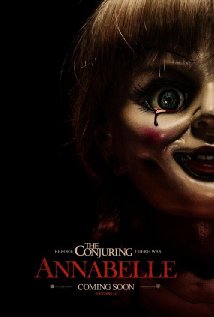
ANNABELLE
US, 2014, 98 minutes, Colour.
Annabelle Wallis, Ward Horton, Tony Amendola, Alfred Woodard.
Directed by John Leonetti.
Annabelle is the name of a deadly doll. Not that that was her real name. Rather, when a sinister young woman, daughter of the next door neighbours to Mia and John, kills her parents with a cult associate, and is wounded, her blood drips down onto the nameless dial doll who then becomes the deadly Annabelle.
Over the decades that have been many films about deadly dolls. Lionel Barrymore starred in a 1930s horror film, Devil Doll. Then there were the sinister dolls, Dead of Night, with Michael Redgrave, and then Anthony Hopkins in Magic. In the 1980s and 90s, there was a series of horror films, Child’s Play, with the doll, Chucky (and the director of Annabelle, John Leonetti, a longtime cinematographer, actually directed Child’s Play 3).
There is another horror connection, this time with the Insidious series and The Conjuring. In the latter, the story is told of real-life Catholic exorcists, a couple, Ed and Lorraine Warren. They were associated with the Amityville hauntings and played a part in riding the house of the devil. Needless to say, some commentators were quite wary of the claims of the Warrens, who were confident and appeared in many television programs and series. Later in Annabelle, the parish priest, Father Peres, suggests that the couple who own the deadly doll, Mia and John, should contact the Warrens. They don’t, but there is a reference at the end as to the final location for the deadly doll, in their museum (with the comment that the doll – which is a Raggedy Ann doll, not porcelain as in the film (perhaps too much information!) - is still blessed twice a month).
The film is not one of those gory horror films that is ugly to look at. Rather, this is something of a slow-burner, gradually building up a sense of terror, especially for the pregnant Mia and after the birth of her daughter, Lia. Every now and then, sometimes more often, there is one of those editing jump cuts which has the audience jumping in their chairs. But in this one, atmosphere is important.
There is quite an explicit Catholic tone in the film, with a couple going to a fairly crowded mass with many young adults (the setting is 1970) with some effective sermons by the parish priest, Father Peres (Tony Amendola). He preaches on sacrifice and laying down one’s life for others just as Jesus did. In fact, after all the events of the film, Mia and John go to Mass once again and Father Peres repeats this sermon about sacrifice. He also preaches against fear of fear. And, he is presented as approachable, the couple coming to him with their difficulties and his offering to help out – which has some temporary dire effects on him, a touch of Satanic possession and a stint in hospital.
The screenplay introduces themes of demons and demonic presence and how the devil into enters into such things as dolls to torment humans and try to take their souls.
The other central character is a book shopkeeper called Evelyn (Alfre Woodard) who is sympathetic towards Mia, offers her books, comes to the apartment to discussion discuss the demons and is finally confronted by the devil doll.
Some of the editing cuts are startling, but the film, by and large, is not so startling, relying on audiences to identify with the young couple and their troubles, the impact of the deadly Annabelle, the religious dimensions of the couple’s experience, building up to a confrontation, not nearly as explicit or melodramatic as in films like The Exorcist, but indicating that it is not improbable for Annabelle to get out of her museum glass case for a sequel.
1. The horror film, but less grizzly and gory than most, relying on atmosphere? The 1970s setting, beliefs in demons and possession?
2. The tradition of devil doll films, the dolls possessed, having an evil personality, cruel and violent?
3. The problem, the discussions about the situation, the opening discussion about the doll and its behaviour, the flashback?
4. The link with The Conjuring, the exorcising couple, the Warrens, their history, with Amityville and The Conjuring and other stories? The indication that their help would be sought? The end, the doll in their museum, blessed twice a month?
5. The couple, their love, apartment, Mia’s pregnancy? John and his studies? Tense moments between the two? His gift of the doll for Mia’s collection? The doll, its face, dress, somewhat bizarre and ugly, sitting on the shelf with the other dolls?
6. The couple as devout, going to Mass, the priest and his homily, the focus on sacrifice, for the good of others, quoting John’s Gospel and the laying down of life for friends? The priest’s personality, friendly, the ritual celebrations, talking with a couple, their going to him for advice? His homily on fighting fear? His comment that the best image of the love of God’s heart is the love of a mother for her child? His visit, his offering to take the doll, his being attacked, possessed, shouting at the door? His collapse, in hospital? His giving the same sermon at the end after Evelyn’s death, laying down life for friends?
7. The neighbours at Mass, pleasant, the scream in the night, the story of their daughter and her going to a cult? Their appearing, murdering the parents? The images of Annabelle as young, as adult, as a ghost, haunting the house, haunting Mia, the attack, the blood dripping from Annabelle on to the doll and the doll becoming Annabelle?
8. The effect on Mia, the sinister action of the sewing machine, the heat and the explosion on the stove, John and his care? The attacks by the ghost? The doll? Mia stabbed, the hospital, the birth of the child? Lia?
9. The device of the film giving a shock-jump every ten minutes or so, the audience jumping, and the sense of growing menace? Mia alone with the baby, her devotion to the baby, John not coming as promised, being trapped, the priest shouting at the door, the ghost of Annabelle, the rescue? The mystery of how the doll was there after being put in the rubbish then appearing in the boxes when the couple moved house?
10. The continued threats to the baby? The writing on the roof, the taking of a soul?
11. The character Evelyn, her store, interest in Mia? The gift of the book for the baby? The visits, their talking, explaining aspects of demonology? Coming to rescue Mia, her support, the threat to the baby, but the doll substituting? Evelyn, her own history with her daughter, going on to the window sill, giving herself, her death, and the seeming death of the doll?
12. The aftermath, the priest and his sermon, happy times for Mia and John? The doll and the sale – and going to the Museum of the Warrens?
Published in Movie Reviews
Published in
Movie Reviews
Tagged under
Saturday, 18 September 2021 19:52
Jamon, Jamon
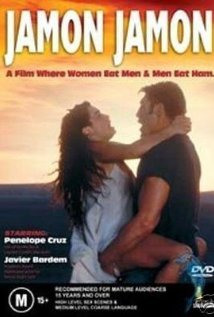
JAMON, JAMON
Spain, 1992, 95 minutes, Colour.
Penelope Cruz, Stefania Sandrelli, Anna Galiena, Juan Diego, Javier Bardem, Jordi Molla.
Directed by Bigas Luna.
Bigas Luna was a prominent Spanish director, noted for his satiric perspectives on Spain and the Spanish way of life. This film was well received, a comedy about a small town in the desert area of Spain, with a factory for producing underwear and for producing ham and delivering it around the countryside.
The film is a star vehicle for the very young Penelope Cruz as well as the young Javier Bardem (they were to appear in Vicki Christina Barcelona in 2007 and were then married). She is a young woman who works in the factory, is pregnant to the son of the factory owner who does not want him to marry this woman who is beneath him. Bardem delivers ham and practises bullfighting with his friend. When the owner of the factory hires him to seduce the young woman, she falls in love with him and then decides that she wants her son to marry the young woman.
The film is a touch melodramatic in its drawing of the characters and in its emotional conflicts, culminating in a fight with legs of ham.
The title of the film refers to ham but also means (a dish of a woman).
1. The films of the director, Spanish sensibility, satiric perspective? Melodramas – with the touch of over-the-top?
2. The title, the focus on ham, the ham industry, the pigs and their slaughter, the delivery of the, ham, putting a suppositum into the pig and its running on the road in the traffic, drawing the attention of Sylvia, the fight with the ham bones? The alternate meaning, “a dish of a woman”?
3. The Spanish locations, desert countryside, the small town, the factories, homes? The musical score?
4. The town, the factory and making underpants, for the international market, Conchita and her style, dominance, interviews with potential models, her brittle relationship with her husband, her pampering her son, her not wanting him to marry Sylvia, looking at the video, choosing Raul, paying him to seduce Sylvia, her protectiveness of her son? The infatuation with Raul, the affair with him, his reluctance?
5. Sylvia, young, working in the factory, the bond with her mother, her mother’s past, prostitution, home, the past with Conchita’s, the present with his son going to the brothel?
6. Sylvia, pregnant, in love with Juan Luis, his love for her, prepared to defy his mother, his mother’s discovery, his facing up to her? The proposal, Sylvia and her wanting to marry? Her mother supporting her? Sylvia and her being a mother figure with the two men and her breasts?
7. Raul and his friend, the opening and the practice for bullfighting? His posing for the underwear, the criteria for big men? The later poster with him? His friend, seeing the stray bull, stripping, the bullfighting practice, their escape, asking Sylvia for clothes?
8. Sylvia attracted to Raul? His being attracted to her? His dilemma?
9. The build-up to the confrontation, the fight with the hams? Raul victorious? Conchita disappointed? A happy ending for Sylvia and Raul?
10. The director and his satire on Spanish characters, relationships, work, the macho attitudes?
Published in Movie Reviews
Published in
Movie Reviews
Tagged under
Saturday, 18 September 2021 19:52
I, Origins
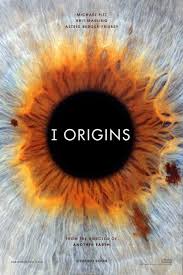
I, ORIGINS
US, 2013, 112 minutes, Colour.
Michael Pitt, Brit Marling, Astrid Burges- Frisby.
Directed by Mike Cahill.
The look of this title is better than what the film might have been called, perhaps should have been called, ‘Eye, Origins’. From the very start, the camera focuses in close-up on an eye, inviting the audience to contemplate the eye and its complexities, the wonder of its creation – or, from the point of view of the central character, Ian, the wonder of its evolution.
It should be said from the outset that this film offers a great deal for audiences to think about and reflect on, especially if they are interested in questions of religion and science. Ultimately, the science group, especially if they are of the atheistic or agnostic persuasion (and we glimpse Ian clutching a book by Richard Dawkins at one stage), may not be convinced by the religious suggestions. Those interested in more transcendent questions should be satisfied, even if the questions are not fully, or to a lesser extent, answered.
We are introduced to Ian in 2006, conducting experiments that might lead to mice and other animals gaining colour sight. Ian is on s a cientific quest to try to find some creature that started its life without sight but which evolved an eye. He is given in assistant, Karen (Brit Marling), who is no mean scientist in herself. She promises to examine the development of many creatures who have not had the power of sight and find one so that experiments can be done, giving sight to the blind. In fact, she does find a worm which is a suitable subject for the experiments.
In the meantime, taking some time off from the laboratory, Ian goes to a party where he is attracted to a woman who is wearing something like a Burkha and is attracted by her eyes, asking if he could photograph them. After a brisk and brusque sexual encounter, she disappears. But Ian finds her face on a billboard advertisement, googles and tracks her down. She is from Latin America, has had a chequered life story, but is attracted to Ian and he to her. They plan a sudden marriage but the bureau requires them to have more documentation. And, in the meantime, Karen rings with the news of what she has discovered. To not give away a surprising development of the plot, it can be simply said that something very drastic happens.
And then a shift to 2012-2013, with the Ian, a celebrity, appearing on television, commended for his scientific breakthroughs.
We also see that he has married Karen and she is pregnant. When the child is born, an expert suggests that the boy might be autistic and does several tests, including eye tests where the attention of the child goes to alternative photos, opting for one. The parents have been told, computerwise, that their child has the identical eyes of an elderly man from Idaho.
This presents Ian and Karen with different challenges. Karen, is far more open (as was Sofia) to explanations beyond the accurately scientific. For Ian, this is anathema. They try to find out if there are other examples of identical eyes – only to discover in the eye computer register that a girl in India whose eyes are exactly the same as Sofia’s.
Karen urges Ian to go to India, to find the girl, to investigate and to see whether such a thing is possible, the same patterning, suggestions of reincarnation. Ian puts up a huge billboard in Delhi and receives many unlikely callers, only to find the little girl and to do some tests with her, the results of which Karen accurately tables and Ian, left bemused and puzzled by the exact likeness of eyes, which, scientifically, should not happen.
And that is where the film ends, sharing the experiences, pondering the scientific, pondering the possibilities of God or something transcendent As Sophia has said the worm that cannot see is still surrounded by light which it cannot see but might come to see. Humans may be surrounded by God or a transcendent presence which they cannot see, but could - or might - some day.
1. The title? I and Eye? Origins and science? Evolution? Possibilities of transcendence and spirituality?
2. The New York City settings, homes, labs, parties? The musical score?
3. The focus on the eye? Initial close-ups? The perfection of the eye, the experiments? Ian, his character, dedication to his work, Karen as his assistant, his Asian- American collaborator? The plan to restore colour vision to animals? The experiments and tests? Karen and information, her capacity for research, her list of animals, finding the worm?
4. Ian, going to the party, the encounter with Sofia, her mask, talking, photographing her eye? The brief sexual encounter and her hurried leaving? Googling her, seeing the poster, identity? Meeting her, the bond between them, relationship? Her background story? The plan to get married? Not having sufficient documents? Her wedding dress? The phone call, going to the lab, Karen’s findings, Sofia’s interest or not, an observer? Going to the hotel, the elevator, her fears, the shock of her death?
5. Sofia, her comments about the worm, it’s not having sight but light around it until it saw it? The religious argument about the presence of God? Prove the existence of God, disproving the existence of God?
6. Seven years passing, Ian married to Karen, her pregnancy, the Asian- American friend, the career? Television interview and Ian’s being a celebrity, because of his breakthrough?
7. Ian, no closure with Sophia’s death, lonely, watching the computer images, masturbation, Karen seeing him, their talking, her indulgence towards him?
8. The baby, the expert’s opinion about autism, the various factors? The discussions? The similarity in eyes with the elderly man? This seeming impossible? The tests, the different photos, the baby looking at particular photos? Their all being in a pattern?
9. Ian, his going to Idaho, finding out about the man, seeing all the images and realities that were in the test?
10. Sofia, finding someone with exactly the same eyes? India?
11. The discussions about going to India, Ian going, Delhi, the experience of India, the hotel, the centre, the possibilities, the girl homeless, putting up the billboard, the phone calls thinking he was after a woman? The girl and her presence? The giving the food to the little girl, the tests and the photos, Karen monitoring, 44% correct? The girl’s fear of the elevator?
12. The end, the film stopping, Karen and her handling of the situation? Ian and the challenge? The arguments for him about something transcendent, his absolute belief in science, tested?
13. The information for the audience, the different stances, pro-science, pro-religion? Mystery?
Published in Movie Reviews
Published in
Movie Reviews
Tagged under
Saturday, 18 September 2021 19:52
Count of Monte Cristo, The/ 2002

THE COUNT OF MONTE CRISTO
US, 2002, 131 minutes, Colour.
Jim Caviezel, Guy Pearce, Richard Harris, James Frain, Dagmar Dominczyk, Michael Wincott, Luis Guzman, Henry Cavill, Peter Godfrey.
Directed by Kevin Reynolds.
The novels by Alexandre Dumas may not be read very much these days, but most of us know the plots because we have seen the movie versions. We have enjoyed The Three Musketeers and The Man in the Iron Mask. In fact, they have been filmed many times over the last sixty years or more. The other favourite is The Count of Monte Cristo. Now there is a new version of this classic.
The newspaper movie guides usually describe the Dumas' stories as 'swashbuckling'. We expect swordfights on castle staircases and some action on horseback. But this is only the surface excitement. In The Count of Monte Cristo we are shown what we might call a parable about revenge. As we watch the film, we are reminded of the Gospel saying of Jesus, 'What does it profit a man to gain the whole world and lose his soul?'
At the opening of the film, Edmond Dantes is asked to deliver a secret letter for Napoleon. Dantes is a decent, loyal man, trusting in authorities, in his close friend and in the woman he wants to marry. He is betrayed by his friend who then marries Edmond's fiancee - she is pregnant though Edmond does not know it. The authorities exile him to the island fortress off Marseilles, the Chateau D'If. Edmond becomes an embittered prisoner, isolated, with revenge almost the only motive to keep him alive. When he encounters a priest in a nearby cell, they work for years at digging a tunnel. When he eventually escapes, he uses a map to find a treasure on the island of Monte Cristo and returns fabulously wealthy to wreak his vengeance on friend, fiancee and the authorities.
One of the important moral issues in the film is how Dantes faces his enemies, coldly implacable, but gradually learns that revenge is self-destructive and he is forced to face himself and find a new peace and some forgiveness.
In the past Robert Donat was Dantes in the classic film version of the 30s. Richard Chamberlain took on the role in the 70s. Now it is the turn of Jim Caviezel, a rather unassuming actor who has been seen in The Thin Red Line, Frequency, Pay it Forward and Angel Eyes. In interviews for the media, Caviezel speaks in very sincere tones about values and morality in his own life and in his career.
The villainous friend is played by Australian Guy Pearce with increasingly aristocratic venom and, maybe, overacting. Richard Harris, in one of his most sympathetic performances, plays the imprisoned priest, the person who begins to change Dantes' hatred into some kind of hope.
The Count of Monte Cristo is not for small children, but parents and older children would enjoy it and be able to talk about Dantes' downfall, his relationship with his fiancee, discreetly filmed, and the morality of hatred and revenge, which is, as Jesus, says, the loss of one's soul.
1. The many film versions? 21st century version, the classic story, the work of Dumas, an experience of French history, in the Napoleonic era and its aftermath?
2. Production values, locations, costumes and decor? The musical score?
3. Locations, the ships, at sea, the ports, Marseilles, the docks? The police and the courts? Châteaux D’if, the office, the cells, the tunnels for escape? The sea, the ships, the smugglers, the beaches? The island of Monte Cristo, the rocks, the pools, the treasure? Lavish society, wealth, dinners, balls, mansions? Scenes in Rome? Paris, trading, the final sequence on Châteaux D’if?
4. Edmond and Fernand, Danglar, the ship, friends, from time, love of Mercedes? Danglar and his role on the ship?
5. Napoleon, his situation, the escapes, trusting Edmond, the letter, his advice, Fernand seeing this, Edmond keeping the secret?
6. His promotion, captain of the ship, happy, with Mercedes, waiting the two years?
7. The letter, Villefort, his response, his father’s loyalty to Napoleon, his behaviour, Edmond, the report, secrecy, Edmond going to the ship, his arrest, the accusations, his disappearance, going to the island, his being flogged every year on the anniversary, in his cell?
8. Edmond and his rage, no belief in God, bent on vengeance, the passing of the years? The encounter with the priest, their talking, the issues, God, revenge, the priest developing Edmond’s talents, reading and writing, study, swordplay? Their digging over the years, the bond between them?
9. The character of the priest, a good man, his offence, imprisonment, saying he was a priest not a saint? The tunnel, the collapse, his death? Edmond, his getting into the cover, the discovery of the priest’s body? Edmond leaping into the sea, getting loose, going to the shore?
10. The smugglers, the boss, his accusations against Jacopo, Jacopo’s greed? Edmond, the proposition of the fight, his not killing Jacopo, that the leader would not lose face, and would have extra crew? The smugglers and their later support of Edmond?
11. Jacopo’s gratitude, his being Edmond’s man? Their work on the ship, put ashore, the leader’s support?
12. Getting the boat, going to Monte Cristo, the search for the treasure, finding it, lavish?
13. The transformation into the Count of Monte Cristo, his wealth, buying the mansion, his appearance, Jacopo as his servant, the vengeance plans?
14. The audience seeing Fernand, unfaithful, Mercedes unhappy? The Count and his lavish parties? Albert as Mercedes’ son?
15. The episode in Rome, Albert, reckless, the setup, the Count of paying for the men to take Albert? The count and his rescue, Albert indebted to him, bringing him into the house, Mercedes recognising him, his mistrust of her, the discussion in the carriage, Fernand not recognising him? The birthday dinner, Albert and his praise, Fernand and his leaving the table for business purposes, the Count’s toast?
16. The lavish parties, society, Villefort and his wife? Villefort and the contracts, the trade? Effortfort and Fernand, their plans to rob’s the Count?
17. The revenge on Fernan, his lack of credit with the banks, his having to go to Danglar, the planned to rob the gold?
18. Fernand and Mercedes, the marriage because of the pregnancy, their past, her telling him the truth about Albert?
19. The count, confronting Danglar, his hanging?
20. Villefort, the truth, his arrest, the gun for a suicide but the Count saying that he deserved more, to prison?
21. The confrontation with Fernand, his bankruptcy, Mercedes telling him the truth, his taking Albert, Albert and his stances against the Count? Mercedes arriving, Albert’s note? The Count learning the truth? Fernand’s disdain, the swords, the fight, Fernand’s death?
22. Everybody going to Châteaux D’if – and a new beginning?
Published in Movie Reviews
Published in
Movie Reviews
Tagged under
Saturday, 18 September 2021 19:52
Una Noche
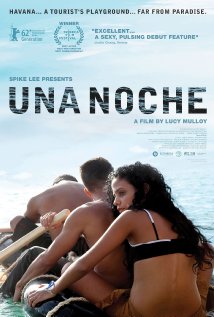
UNA NOCHE
US/Cuba, 2013, 90 minutes, Colour.
Dariel Arrechaga, Anailin de la Rua de la Torre, Javier Nunez, Florian.
Directed by Lucy Mulloy.
Una Noche was written and directed by Lucy Mulloy, British, based in New York City but spending time in Cuba. She researched the story about young people wanting to cross the 90 miles from Cuba to Miami, unskilled, risking everything to leave Cuba.
The focus is on a pair of twins and the bond between them until the older, Lila, detects a change in her brother, Elio. She discovers that he is planning to leave Cuba, helping his friend role, who works in a restaurant kitchen with him, and to whom he is physically attracted. The film make something of homophobia amongst young people in Havana, a gang of boys ridiculing a gay young man, rail picking up a prostitute and discovering that she was transvestite, ilio afraid if he is attractions were known.
Eventually, the three set sail for Miami, have engine trouble, have to row, have their boat capsised with that disappearance of ilio, with rail and Lila hanging on until they reach land.
1. Cuban story? Inspired by actual events? The writer-director and had not been Cuban, but sympathetic to Cubans?
2. The locations, Havana, its landmarks, the coast of the sea? The town, the poor areas, the restaurant kitchen, squalid apartments, the world of prostitutes? The musical score?
3. The title, the culmination of the story?
4. Lila, the introduction to her, her voice-over, her relationship with Elio, older twin, on the bikes together, the bonds between them, the past, they growing up, their hard military father and his discipline, the suffering mother? Their prospects?
5. Lila, saying she detected a change in her brother, following him, discovering his plan? And his sexual orientation, infatuation with Raul, her going to the kitchen, meeting Raul, his thinking she was Elio’s girlfriend? The engine, the sabotage for the trip? The tension with her brother?
6. Elio, his work, the talk about sexuality and homosexuality in the kitchen, the behaviour of others, the boss and his talk? Raul working there, wanting to get out, enlisting Elio’s help? Elio getting the medication, the contact, his enormous case of medications? The medication for AIDS? Buying the engine and the sympathetic seller? The sabotage for the trip? Getting ready, prepared to leave his family?
7. The young men in the street, the group, at play, the bikes, the gay boy walking past and their derisive comments?
8. The effect of this on Elio, homophobia, Raul and his picking up the prostitute, his shock in discovering she was a transvestite? Elio and his kiss?
9. Raul, his mother, wanting her to drink the milk, AIDS, her sexual encounter with the tourist, Raul’s attack on him? His mother working at the bridge, the client choosing her over the younger girls? The police, pursuing Raul for attacking the tourist?
10. The decision to leave, Lila and her sudden appearance, going on the boat, the engine, failing, paddling, the sea and Lila not able to swim, Raul helping her, the fear of the sharks? Capsize, Elio lost, Raul and Lila hanging on?
11. There being found, where? Their hopes? The young people finding them and their laughing? The scene of the police and the arrest at the bike? The future, Lila’s hope that Elio would be found?
Published in Movie Reviews
Published in
Movie Reviews
Tagged under
Saturday, 18 September 2021 19:52
Outriders, The
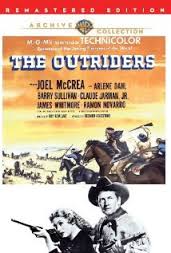
THE OUTRIDERS
US, 1950, 93 minutes, Colour.
Joel Mc Rea, Arlene Dahl, Barry Sullivan, Claude Jarman Jr, James Whitmore, Ramon Novarro, Jeff Corey, Ted de Corsia.
Directed by Roy Rowland.
The Outriders is an MGM supporting feature of 1950, a standard western with a standard western cast, Joel Mc Rea at this stage of his career specialising in westerns, Arlene Dahl emerging as a glamorous star at MGM, Barry Sullivan as a sturdy presence in many of the different kinds of films at this time, James Whitmore also reliable at MGM, Claude Jarman Jr having appeared in The Yearling and Intruder in the Dust. Veteran star, Ramon Navarro, the 1925 Ben Hur, appears as a Spanish grandee.
The film opens in our Union prison, with escapes, the group teaming up with a representative of Quantrell’s Raiders, a mission to rob gold for the confederacy, an emotional sub-plot and the end of the war.
1. A 1950s Western? The end of the Civil War? Quantrell’s Raiders, ruthless and committing massacres?
2. The picture of the West, the Union prison, the terrain, Santa Fe, the trek to St Louis?
3. The cast, standard for this kind of film? The musical score?
4. The scenes in the prison, the Confederate’s, hard done by, the Union commander, rumours of smallpox, the prisoners to go to the river, to wash? The young guard? The three and their attack on him, Jesse brutally killing him, the escape?
5. Stealing the clothes, going to the homestead, Will making a mistake and using Confederate language rather than Union, the farmer going for Union help? Their escape, meeting Keeley, being welcomed, the set-up to rob the gold, Will’s knowledge of Santa Fe and the visual map and his leading them there?
6. The character of Will, the strong Joel Mc Rea type of character? Upright? Principled? Four years of war being enough? Jesse, the man from New Orleans, brutally killing the soldier, attracted to Jen, willing to break his friendship with Will, Will and the attraction to Jen and his dancing, warning her, saving her? Jesse being tied up, cut free, killing the man, going to the other side?
7. The wealthy man, transferring the gold, his taking the friar for his health? Jen and her son, her dead husband killed as a coward? Will and his men? The journey? The swollen river, the difficulties in crossing, Jen’s stepson dying?
8. Keeley, wanting the gold, allegedly for the Confederate cause, the control?
9. Jen, her story about her stepson, travelling, hopes, attracted to Will? The men, the drinking, the dancing, her coming out of the wagon and dancing? Will’s reaction?
10. Clint, old, sturdy, loyal to Will, accompanying him, antagonistic towards Jesse? Helping Will, at the end and the final confrontation?
11. The news of the end of the war, the different destination for the gold, Will and his decision to confront Keeley, Keeley being shot dead by the grandee? His being shot? The final fight, the strategy of going behind the men, Jesse hiding, his lies about having no bullets, Will shooting?
12. A different future after the Civil War?
Published in Movie Reviews
Published in
Movie Reviews
Tagged under